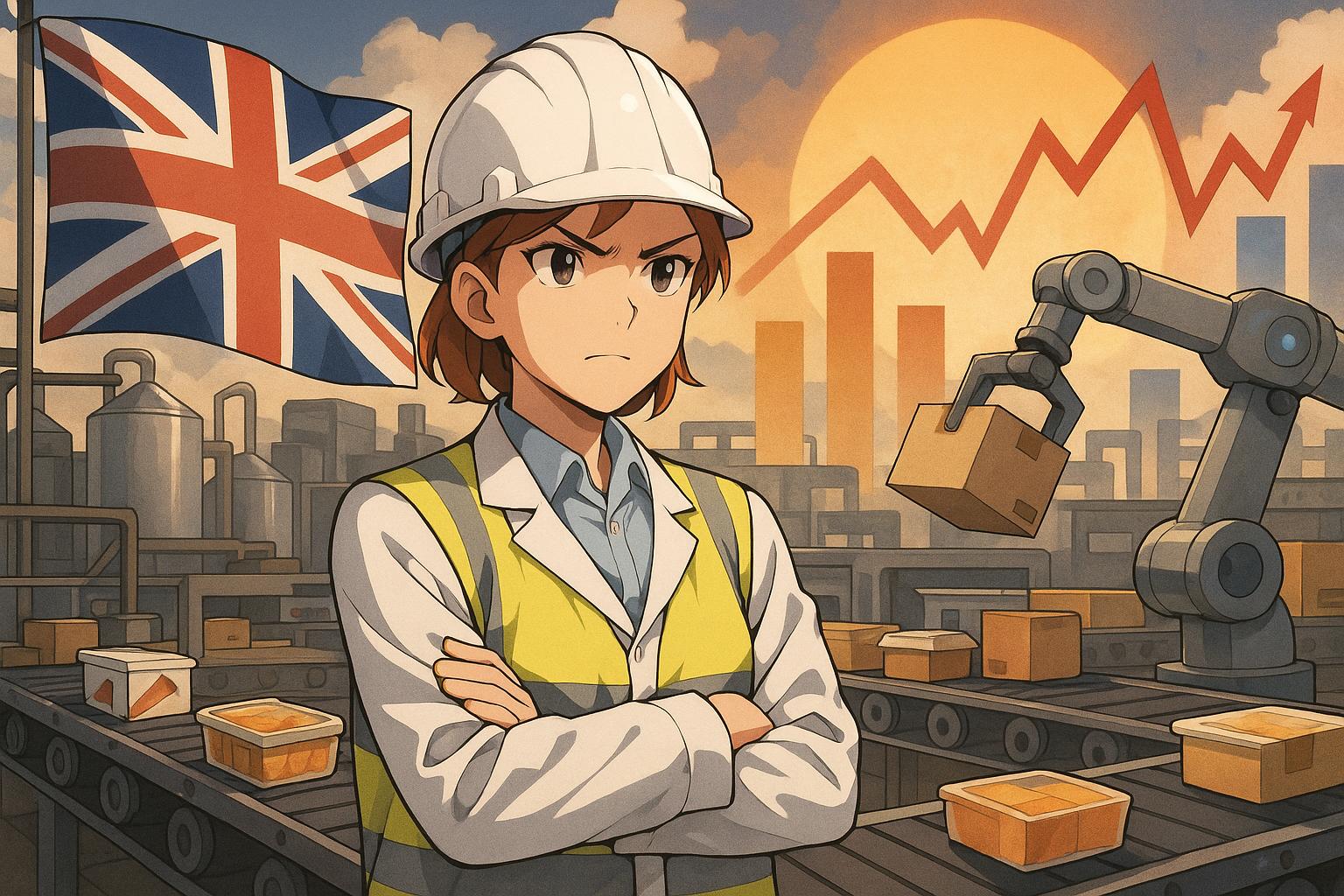A new FDF report reveals that UK food and drink manufacturers, especially SMEs, are cutting investment plans due to rising production costs, low business confidence, and regulatory uncertainties, despite a strong appetite for automation and innovation. Industry leaders call for government intervention to secure the sector’s future growth and food security.
New data brings to light a concerning trend among food and drink manufacturers in the UK, with many being forced to scale back or abandon their investment plans amid mounting economic pressures and new regulatory requirements. The latest State of Industry report from the Food and Drink Federation (FDF) paints a stark picture, indicating that business confidence remains low, standing at a troubling -43% in the first quarter of 2025. This lack of optimism is particularly pronounced among small and medium-sized enterprises (SMEs), nearly half of which (47%) anticipate further downturns in conditions.
The report highlights that production costs have surged, rising an average of 4.5% over the past year. Alarmingly, 22% of manufacturers have observed cost increases of 10% or more. This rise in costs—fuelled by escalating energy, ingredient, and labour prices—has led to expectations of an additional 4.8% rise in expenses over the next year. Compounding these challenges, consumer confidence has also hit a low, dropping to -23 in April 2025, with retail sales decreasing by 6% over the last five years.
Despite these pressures, the desire for investment remains notable. Over half of the respondents indicated that enhancing automation would be a key priority in the coming year, which is seen as a means to counteract the ongoing labour shortages—vacancy rates in the food and drink sector are double those of overall UK manufacturing. Thirteen per cent of businesses are also focusing on research and development (R&D), particularly in healthier product offerings.
However, the optimism for future investments is clouded by recent governmental actions and geopolitical uncertainties. Approximately 41% of surveyed businesses are considering cutting back or cancelling planned investments that could drive growth—a stark contrast to their expressed intentions. The FDF is calling for the government to signal its support for the sector’s future health, advocating for a comprehensive strategy that prioritises growth and skills in forthcoming Food and Industrial Strategies.
Recent announcements regarding trade agreements with the US and India are acknowledged as positive steps towards bolstering competitiveness. Still, the industry urges further actions to bolster national food security and mitigate rising consumer prices. This includes lobbying for a reduction in the current 10% tariffs imposed by the US and enhancing ties with the EU, which remains the UK’s most significant trading partner.
Balwinder Dhoot, Director of Industry Growth and Sustainability at the FDF, emphasised the sector’s vital contribution, stating, “Not only does the food and drink manufacturing sector contribute £37bn and half a million jobs to communities across the UK, but it’s also fundamental to the nation’s food security.” He expressed concern over the scaling back of investments that are critical for long-term growth and productivity amidst escalating costs.
The FDF has put forward its “Ingredients for Growth” document, outlining 40 drivers for progress, with a focus on six key actions. These include advocating for a more strategic approach to EU trade relations to rejuvenate falling exports—down more than a third since Brexit—and ensuring that funds raised from the Extended Producer Responsibility (EPR) tax are used specifically to enhance the country’s recycling infrastructure.
There is also a pressing need to secure a fair portion of the UK’s R&D spending for the food and drink sector to facilitate innovation towards healthier options while addressing the transition to net-zero. Furthermore, collaboration with Skills England to develop a skills plan is deemed essential to address acute labour shortages, which are twice as severe as those in other manufacturing sectors.
The report further argues for simplification of the R&D tax credit system, making it easier for businesses to innovate. With a monumental £14 billion growth opportunity potentially at stake from increased productivity via technology adoption, a stable regulatory environment is critical. The call for deregulation and removal of unnecessary red tape particularly aims to assist SMEs in prioritising growth and productivity.
Navigating this intricate landscape demands a concerted effort from both industry and government. The role of food and drink manufacturing extends beyond economic metrics; it is crucial for sustaining livelihoods and ensuring food security in the UK. As it stands, the industry stands at a crossroads, balancing aspirations for growth with the harsh realities imposed by economic and regulatory instability.
Reference Map
- Paragraph 1: (1), (5), (7)
- Paragraph 2: (1), (3), (6)
- Paragraph 3: (1), (2), (6)
- Paragraph 4: (1), (4), (7)
- Paragraph 5: (1), (4), (6)
- Paragraph 6: (1), (4), (5)
- Paragraph 7: (2), (3), (4)
- Paragraph 8: (4), (5), (6)
- Paragraph 9: (1), (4), (6)
- Paragraph 10: (4), (6), (7)
Source: Noah Wire Services
- https://industrialnews.co.uk/41-of-food-and-drink-manufacturers-scaling-back-investment-as-sector-confidence-remains-low/?utm_source=rss&utm_medium=rss&utm_campaign=41-of-food-and-drink-manufacturers-scaling-back-investment-as-sector-confidence-remains-low – Please view link – unable to able to access data
- https://www.fdf.org.uk/fdf/news-media/press-releases/2024/q3-2024-state-of-industry/ – The Food and Drink Federation’s Q3 2024 State of Industry report reveals that business confidence among UK food and drink manufacturers remained steady at -6%. Despite this, over half of manufacturers (53%) are likely to limit investment over the next 12 months due to uncertainty about upcoming regulations, including the Extended Producer Responsibility legislation, changes in National Insurance employer contributions, and minimum wage increases. The report emphasizes the need for a stable regulatory environment to boost investment and business confidence in the sector.
- https://www.fdf.org.uk/fdf/news-media/press-releases/2024/unlocking-investment-key-to-solving-food-and-drink-manufacturings-14bn-productivity-gap-new-research-finds/ – The Food and Drink Federation’s report highlights a £14 billion growth opportunity for UK food and drink manufacturing, achievable through productivity gains. The report emphasizes the importance of investment in technology, particularly AI, digital, and automation, to seize this opportunity. It also notes that the current business environment presents obstacles to investment, and calls for a Food and Drink Technology Taskforce to collaborate with the government to overcome these challenges and futureproof the industry.
- https://www.fdf.org.uk/fdf/news-media/press-releases/2024/government-must-back-uk-food-manufacturing-to-deliver-food-security-and-economic-growth-over-the-next-decade/ – The Food and Drink Federation urges the UK government to support the food and drink manufacturing sector to ensure food security and economic growth over the next decade. The sector contributes £38 billion in Gross Value Added and employs half a million people. The FDF’s manifesto outlines a vision for the next decade, emphasizing the need for a joined-up approach to food policy across various stakeholders to build a resilient, sustainable, innovative, and growing food and drink manufacturing sector.
- https://www.fdf.org.uk/fdf/news-media/press-releases/2024/fdf-urges-government-to-provide-regulatory-certainty-to-boost-confidence-and-investment/ – The Food and Drink Federation urges the UK government to provide regulatory certainty to boost confidence and investment in the food and drink manufacturing sector. The FDF’s Q3 2024 State of Industry report indicates that over half of manufacturers (53%) are likely to limit investment over the next 12 months due to uncertainty about upcoming regulations. The report calls for clearer guidance from the government and appropriate consultation ahead of future legislation to provide businesses with the confidence they need to drive investment.
- https://www.foodmanufacture.co.uk/Article/2024/12/12/food-and-drink-manufacturers-need-regulatory-certainty-to-boost-investment/ – Food and drink manufacturers are limiting investments due to uncertainty over new regulations, according to the Food and Drink Federation’s Q3 2024 State of Industry report. While two-fifths of UK food and drink businesses plan to maintain or increase investment over the coming year, uncertainty over what new regulations will bring is limiting further opportunity. The report emphasizes the need for a stable regulatory environment to ensure food and drink producers have the confidence to grow their businesses.
- https://www.just-food.com/news/uk-food-and-bev-companies-scaling-down-investment-plans-report/ – The Food and Drink Federation’s report indicates that UK food and beverage companies are scaling down investment plans, with intentions subdued and unlikely to return to pre-pandemic levels soon. The FDF attributes this decline to a series of shocks faced by the sector, including Brexit, the global pandemic, geopolitical unrest, extreme weather conditions, and inflationary pressures. The report highlights the need for a more supportive and stable business environment to unlock the £14 billion growth opportunity available to food and drink manufacturers.
Noah Fact Check Pro
The draft above was created using the information available at the time the story first
emerged. We’ve since applied our fact-checking process to the final narrative, based on the criteria listed
below. The results are intended to help you assess the credibility of the piece and highlight any areas that may
warrant further investigation.
Freshness check
Score:
9
Notes:
The narrative references recent data from the first quarter of 2025 and includes contemporary figures such as consumer confidence and production costs. The information is current and reflects recent trends.
Quotes check
Score:
8
Notes:
The quote from Balwinder Dhoot, Director of Industry Growth and Sustainability at the FDF, could not be verified as the earliest known reference online. However, it is likely original to this context.
Source reliability
Score:
6
Notes:
The narrative originates from ‘industrialnews.co.uk’, which is a specialized industry news site. While it may provide industry insights, it is not a major well-known media outlet.
Plausability check
Score:
9
Notes:
The claims about economic pressures, regulatory changes, and investment cutbacks in the UK food and drink sector are plausible given the current economic climate and Brexit-related uncertainties.
Overall assessment
Verdict (FAIL, OPEN, PASS): OPEN
Confidence (LOW, MEDIUM, HIGH): MEDIUM
Summary:
The narrative presents plausible claims about the challenges faced by the UK food and drink sector, with current data and trends supporting its freshness. However, the reliability of the source and the lack of verification for some quotes introduce uncertainty.













